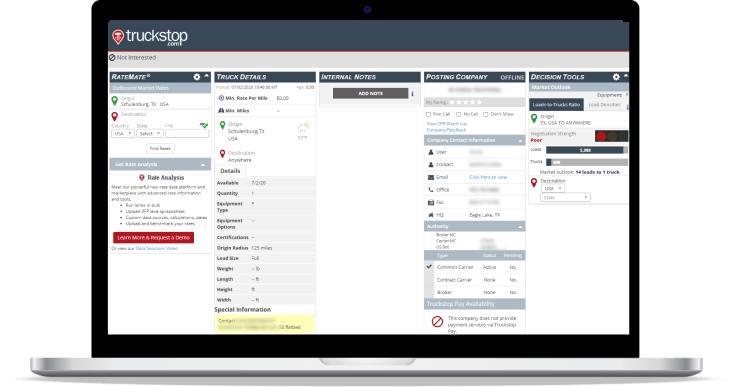How To Get A Freight Broker License
If you want to act as a freight broker, matching goods that need to be shipped with trucking companies that do the shipping, you will need a freight broker license, AKA a load broker license. Freight brokers are regulated by the Federal Motor Carrier Safety Administration (FMCSA), and the requirements can be confusing. Fortunately, all you need to do is follow a step-by-step process. So how do you get your freight broker license? Here is what you should know.

What is a freight broker?
A freight broker acts as a transportation intermediary. Freight brokers do not ship cargo themselves or have cargo to ship, but they negotiate transactions between shippers and carriers.
It's important to understand the differences between freight brokers and freight forwarders. A freight broker does not actually handle shipments. A freight forwarder takes physical possession of goods that need to be shipped, consolidates several small shipments into a larger shipment, and then coordinates that shipment's transportation. The same company can provide both brokerage and forwarding, but for this article, we will focus only on freight broker certification.
What are the advantages of being a licensed freight broker?
If you value freedom, independence, and a strong earning potential, becoming a licensed freight broker can be a great choice. There are many advantages to obtaining a freight brokerage license, including:
No cap on earnings
As a freight broker, you have an earning potential limited only by your ability to work hard. You are paid on commission for each load you successfully book and move, and top brokers can easily exceed $150,000 per year. You can also decide to start your own brokerage company, managing a team of freight brokers. Because this takes a lot of startup capital, many people start as independent freight agents and then build a team slowly over time.
No commute or time on the road
Maybe you're a driver tired of missing birthdays and holidays. Or maybe you're in a different industry looking for less travel or commuting time. Whatever your background, if you like the transportation industry but want to work from home, becoming a freight broker may be right for you. It takes hard work to be successful, but you can also take time off as needed rather than being stuck with a limited amount of vacation or PTO.

Low startup costs
You can get started for just a few thousand dollars, maybe less if you start by working for an established freight broker. The point is to start small as an independent agent and then gradually build up your business over time.
What are the challenges of being a licensed freight broker?
No job or career is perfect. Before we get into the weeds of how to get your freight broker license, these are some of the challenges you might face:
Managing risk
One of the most stressful parts of any business is managing risk, and freight brokers are not immune. You may find yourself in situations where you have to pay the carrier before the shipper pays you. You might hit slow patches when there's less work coming in. It can take a while to get established, so be prepared for income ups and downs.
Establishing trust
Building trust with clients is hard in any industry. As a freight broker, you need to prove to both shippers and carriers that you're reliable and won't disappear when they need you most. To build a successful business, you also have to consistently win over new clients, which can be tough if networking isn't your strongest suit.

Contract clauses
To do business with major carriers or shippers, you may need to sign contracts filled with legal jargon. Some clauses, such as non-compete agreements, can limit your ability to do certain things. For example, if a customer gets a quote directly from the carrier, and then asks you to beat it, you may not be allowed to. Always have an attorney who knows the trucking business review any contract before you sign it, and make sure you know and understand exactly what it says.
6 steps to getting your freight broker license
What are the freight broker license requirements, and what is the process for obtaining a broker license for freight? Here's what you need to do.
1. Consider some training.
It's not required by law, but you can set yourself up for success by going through a freight broker training program. Find an online training course or work through one of the many training books out there. If possible, you may also want to get some hands-on practice at an existing freight brokerage company. Plan to spend about a month developing your skills and knowledge.
2. Choose a business structure.
Freight brokers can organize as one of three types of business: sole proprietorship, partnership, or corporation. Each has specific tax implications and documentation requirements. Because your business structure can have wide-ranging, long-term impacts on your company, it is highly recommended to get guidance from a business attorney and tax professional before choosing.
3. Apply for broker authority.
The next step is to apply for broker authority by submitting Form OP-1 to the FMCSA. The form is fairly straightforward, except you'll need to decide whether to apply for "Broker of Household Goods," "Broker of Property (except Household Goods)," or both. As of 2020, the filing fee is $300 per type or $600 for both. If you apply online, you'll get your motor carrier number right away, which you need for the rest of the process.
4. Get a surety bond.
A surety bond is required by the FMCSA to ensure that you follow all guidelines and regulations. For freight brokers, the required amount of the bond is $75,000. But you don't have to raise all that money yourself. You can work with a surety company that will put up the bond for you in exchange for a small premium. Assuming you don't break the rules, nobody pays anything else. If you do break the terms of the bond, you can be sued up to the limits of the bond. In that case, the surety company would pay the claim, but you will have to reimburse them for however much they pay out on your behalf.
5. Choose a process agent.
You will need a process agent in every state where you write contracts. If any legal proceedings are brought against your business, a process agent is simply someone who agrees to accept any court papers being served on your behalf. Some freight brokers use individual agents in each state, while others select a national company that offers process agent services in all 50 states. You will need to file Form BOC-3 with the FMCSA to declare your choice of process agents.
6. Register through the Unified Registration System.
The last step is to register with the FMCSA through the Unified Registration System (URS). This system combines all the forms needed to complete your registration into a single, easy-to-use online application form.
After completing your URS application, you'll need to learn all the relevant state regulations on interstate commerce in the states where you plan to do business. Contact each state's regulatory agency for more information.
Freight broker license costs
Part of understanding how to get a freight broker license is knowing the costs involved. There are four basic types of expenses:
Training cost
The cost of training varies dramatically, depending on whether you work your way through training books or sign up for a class. Shop around to find the best deal.
Freight broker license cost
The actual cost of your license is $300 for one category or $600 for two. You need to pay this amount to the FMCSA in step three of the process above. Note:You have to update your information every two years, but it's free.
Surety bond
Again, the surety bond for a freight broker is $75,000. You can get this bond from a surety company for a small premium. Your exact payment depends mostly on your credit score, but it's usually 2% to 4% of the bond amount, or $1,500 to $3,000 each year. You'll need to renew your bond each year by paying the designated premium.
Organizational expenses
Depending on how you set up your company, you might need to get a business license and insurance and pay other startup and organizational costs. Talk to your attorney and tax professional about any expenses you should expect.
Use a load board to find qualified carriers and shippers.
Once your freight brokerage is ready to go, it's time to find carriers and shippers. Working with a digital load board makes it faster and easier.

Truckstop.com connects tens of thousands of carriers, shippers, and brokers through a complete technological solution that includes freight matching, planning and tracking tools, transportation management systems (TMS), real-time rate analysis, and convenient payment solutions. Truckstop.com is also fully integrated with most of the major software solutions in the industry. As one of the internet's first load boards, it's also among the most trusted. Let Truckstop.com help you make the connections you need to build a successful new freight brokerage company.
How To Get A Freight Broker License
Source: https://truckstop.com/blog/6-steps-to-get-a-freight-broker-license/
Posted by: farmerwithent.blogspot.com

0 Response to "How To Get A Freight Broker License"
Post a Comment